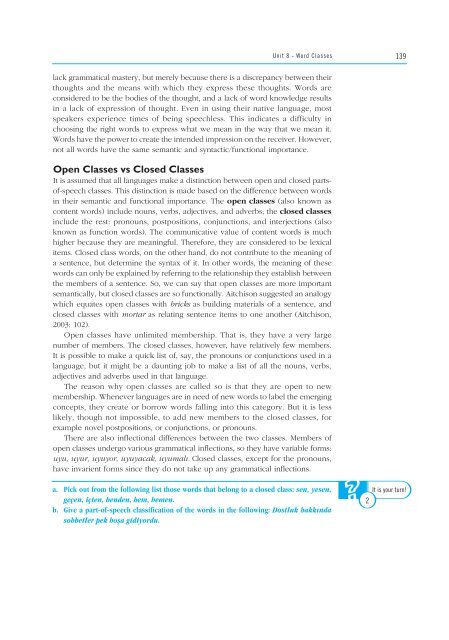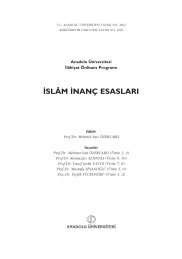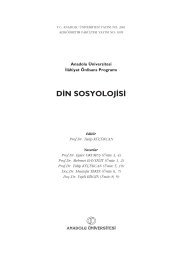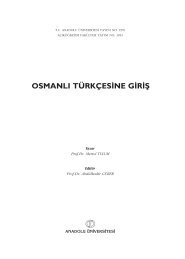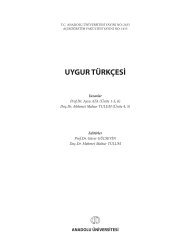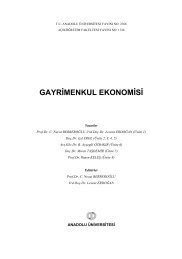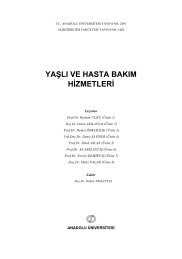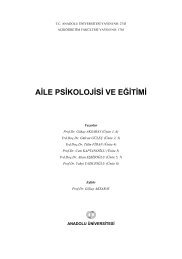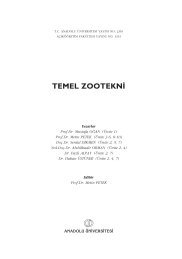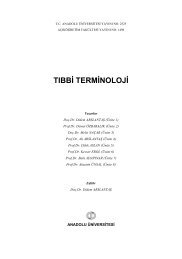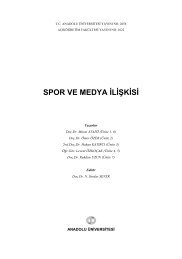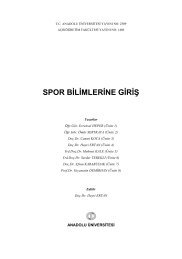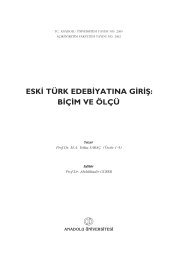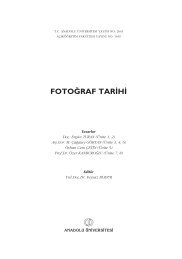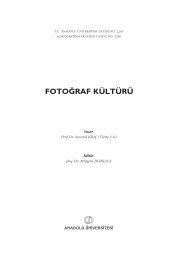turkish phonology and morphology (türkçe ses ve b‹ç‹mb‹lg‹s‹)
turkish phonology and morphology (türkçe ses ve b‹ç‹mb‹lg‹s‹)
turkish phonology and morphology (türkçe ses ve b‹ç‹mb‹lg‹s‹)
Create successful ePaper yourself
Turn your PDF publications into a flip-book with our unique Google optimized e-Paper software.
Unit 8 - Word Clas<strong>ses</strong><br />
lack grammatical mastery, but merely because there is a discrepancy between their<br />
thoughts <strong>and</strong> the means with which they express these thoughts. Words are<br />
considered to be the bodies of the thought, <strong>and</strong> a lack of word knowledge results<br />
in a lack of expression of thought. E<strong>ve</strong>n in using their nati<strong>ve</strong> language, most<br />
speakers experience times of being speechless. This indicates a difficulty in<br />
choosing the right words to express what we mean in the way that we mean it.<br />
Words ha<strong>ve</strong> the power to create the intended impression on the recei<strong>ve</strong>r. Howe<strong>ve</strong>r,<br />
not all words ha<strong>ve</strong> the same semantic <strong>and</strong> syntactic/functional importance.<br />
Open Clas<strong>ses</strong> vs Closed Clas<strong>ses</strong><br />
It is assumed that all languages make a distinction between open <strong>and</strong> closed partsof-speech<br />
clas<strong>ses</strong>. This distinction is made based on the difference between words<br />
in their semantic <strong>and</strong> functional importance. The open clas<strong>ses</strong> (also known as<br />
content words) include nouns, <strong>ve</strong>rbs, adjecti<strong>ve</strong>s, <strong>and</strong> ad<strong>ve</strong>rbs; the closed clas<strong>ses</strong><br />
include the rest: pronouns, postpositions, conjunctions, <strong>and</strong> interjections (also<br />
known as function words). The communicati<strong>ve</strong> value of content words is much<br />
higher because they are meaningful. Therefore, they are considered to be lexical<br />
items. Closed class words, on the other h<strong>and</strong>, do not contribute to the meaning of<br />
a sentence, but determine the syntax of it. In other words, the meaning of these<br />
words can only be explained by referring to the relationship they establish between<br />
the members of a sentence. So, we can say that open clas<strong>ses</strong> are more important<br />
semantically, but closed clas<strong>ses</strong> are so functionally. Aitchison suggested an analogy<br />
which equates open clas<strong>ses</strong> with bricks as building materials of a sentence, <strong>and</strong><br />
closed clas<strong>ses</strong> with mortar as relating sentence items to one another (Aitchison,<br />
2003: 102).<br />
Open clas<strong>ses</strong> ha<strong>ve</strong> unlimited membership. That is, they ha<strong>ve</strong> a <strong>ve</strong>ry large<br />
number of members. The closed clas<strong>ses</strong>, howe<strong>ve</strong>r, ha<strong>ve</strong> relati<strong>ve</strong>ly few members.<br />
It is possible to make a quick list of, say, the pronouns or conjunctions used in a<br />
language, but it might be a daunting job to make a list of all the nouns, <strong>ve</strong>rbs,<br />
adjecti<strong>ve</strong>s <strong>and</strong> ad<strong>ve</strong>rbs used in that language.<br />
The reason why open clas<strong>ses</strong> are called so is that they are open to new<br />
membership. Whene<strong>ve</strong>r languages are in need of new words to label the emerging<br />
concepts, they create or borrow words falling into this category. But it is less<br />
likely, though not impossible, to add new members to the closed clas<strong>ses</strong>, for<br />
example no<strong>ve</strong>l postpositions, or conjunctions, or pronouns.<br />
There are also inflectional differences between the two clas<strong>ses</strong>. Members of<br />
open clas<strong>ses</strong> undergo various grammatical inflections, so they ha<strong>ve</strong> variable forms:<br />
uyu, uyur, uyuyor, uyuyacak, uyumal›. Closed clas<strong>ses</strong>, except It is your for turn! the pronouns,<br />
ha<strong>ve</strong> invarient forms since they do not take up any grammatical inflections. 1 1<br />
a. Pick out from the following list those words that belong to a closed It is your class: turn! sen, yesen,<br />
It is your turn!<br />
geçen, içten, benden, hem, hemen.<br />
2 2<br />
b. Gi<strong>ve</strong> a part-of-speech classification of the words in the following: Dostluk hakk›nda<br />
sohbetler pek hofla gidiyordu.<br />
It is your turn!<br />
It is your turn!<br />
3 3<br />
139<br />
It is your turn!<br />
It is your turn!<br />
It is your turn!<br />
4 4<br />
It is your turn!<br />
It is your turn!<br />
5 5<br />
It is your turn!<br />
It is your turn!<br />
6 6


